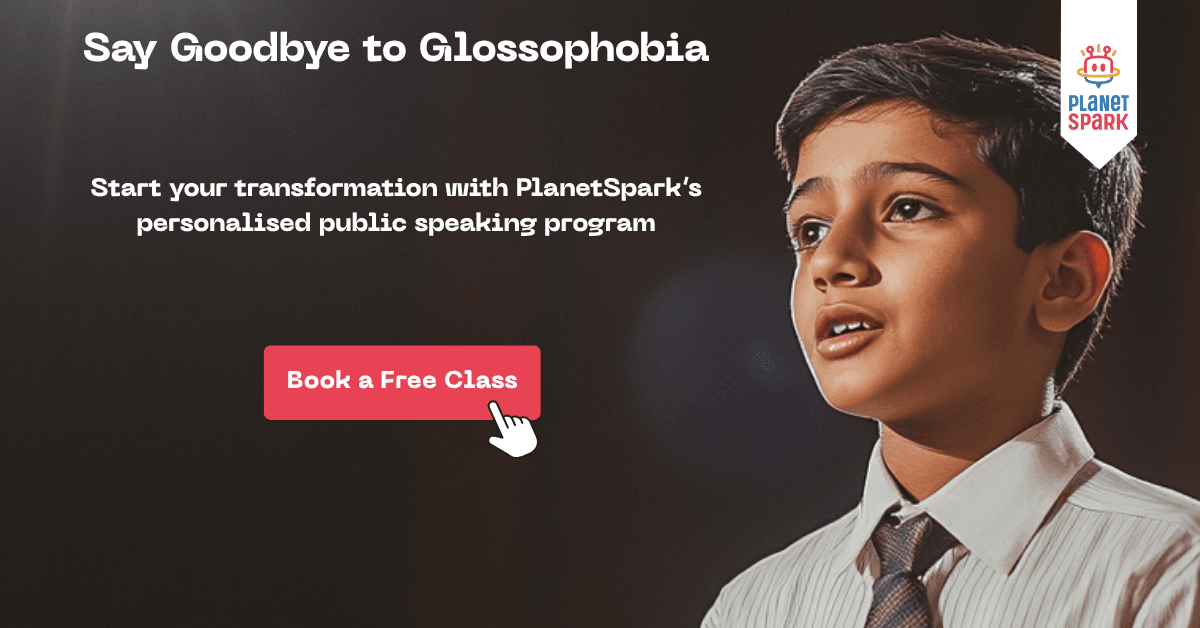Overcoming Glossophobia: Causes, Treatment & Tips

Table of Contents
- What is Glossophobia?
- Causes of Glossophobia
- Symptoms of Glossophobia
- How the Brain Reacts: The Science Behind Glossophobia
- Glossophobia in Children: Why It Needs Early Attention
- Can Glossophobia Be Cured?
- Tips for Parents: How to Support a Child with Glossophobia
- How Practicing Public Speaking Helps Combat Glossophobia
- Treatments and Techniques to Overcome Glossophobia
- The Role of School and Teachers
- Glossophobia and the “Flight or Fight” Response
- Why Choose PlanetSpark to Help Your Child Overcome Glossopho
- FAQs About Glossophobia
Have you ever felt your heart race or your hands tremble before addressing an audience? That feeling isn’t uncommon and it has a name: Glossophobia. Often referred to as the fear of public speaking, glossophobia can cause intense anxiety, impacting both children and adults.
For children especially, this fear can hinder classroom participation, reduce confidence, and limit leadership development. The good news? Glossophobia is manageable and even conquerable with the right tools, support, and consistent practice.
This blog explores glossophobia in depth, its causes, symptoms, the science behind it, and how children (and adults) can overcome it, especially with the help of structured programmes like PlanetSpark’s Public Speaking classes.
What is Glossophobia?
Glossophobia is a type of performance anxiety characterised by a fear of speaking in front of others. While it’s commonly experienced during presentations or speeches, even reading aloud or answering a question in class can trigger anxiety in children suffering from glossophobia.
It’s estimated that 77% of people experience some level of anxiety related to public speaking. For some, it’s manageable. For others, it’s a crippling fear that can interfere with academic, professional, and personal growth.

Causes of Glossophobia
Understanding the root of glossophobia helps in tailoring effective interventions. The fear of public speaking often stems from a combination of psychological, biological, and environmental factors.
1. Fear of Judgment
Children may worry about how they are perceived, especially if they have faced criticism or embarrassment in the past.
2. Past Negative Experiences
A bad presentation, peer teasing, or even an overly strict teacher can create trauma that resurfaces in future speaking situations.
3. Lack of Confidence
Limited exposure to public speaking, a timid personality, or a general lack of self-assurance can trigger glossophobia.
4. Genetic Predisposition
Children who are naturally shy or have parents with anxiety may be more prone to develop glossophobia.
5. Fight or Flight Response
Public speaking is often perceived by the brain as a threat. This triggers the fight-or-flight response causing sweating, rapid heartbeat, dry mouth, and mental blocks.
Speak Freely, Fearlessly
Enroll in a free session at PlanetSpark and begin your journey toward confident communication.
Symptoms of Glossophobia
Glossophobia can show up both physically and emotionally. Common symptoms include:
Rapid heartbeat or shortness of breath
Sweaty palms and dry mouth
Nausea or stomach discomfort
Shaking hands or legs
Blank mind or forgetting words
Avoidance behavior (refusal to speak or participate)
For children, this might look like a refusal to go to school on days with presentations, frequent complaints of stomachaches, or tearful protests before speech assignments.
How the Brain Reacts: The Science Behind Glossophobia
When someone with glossophobia faces a public speaking situation, the amygdala (a part of the brain that processes fear) becomes hyperactive. This triggers a cascade of physical reactions: adrenaline surges, muscles tighten, and logical thinking becomes impaired.
This explains why even well-prepared children may suddenly freeze during presentations. It's not lack of preparation, it’s biology.
Fortunately, the brain is adaptable. With repeated exposure, structured practice, and emotional regulation techniques, the amygdala’s reaction to public speaking can significantly reduce.
Glossophobia in Children: Why It Needs Early Attention
While adults can develop glossophobia too, early intervention during childhood is critical. Ignoring this fear may:
Lower self-esteem
Reduce classroom participation
Impact academic scores
Limit leadership or extracurricular opportunities
Helping your child overcome glossophobia early builds lifelong communication skills, career-readiness, and personal confidence.
Can Glossophobia Be Cured?
While glossophobia may never disappear entirely for some people, it can be managed effectively to the point where speaking in public becomes comfortable and even enjoyable.
Many children have transformed from silent observers to confident public speakers through consistent exposure and guided training. The key lies in practice, mindset shifts, and expert coaching.
Tips for Parents: How to Support a Child with Glossophobia
As a parent, you play a pivotal role in helping your child manage and overcome this fear. Here are some ways you can help:
1. Normalize the Fear
Let your child know that it’s perfectly okay to feel nervous. Share your own stories of public speaking anxiety.
2. Celebrate Small Wins
If your child answers a question in class or reads a story aloud, praise the effort, not just the result.
3. Avoid Pressure
Pushing your child into public speaking without preparation can worsen the fear. Start with small, safe spaces like family gatherings or storytelling at home.
4. Encourage Participation in Speaking Activities
Encourage your child to join debate clubs, school assemblies, or storytelling competitions.
5. Enroll in a Structured Program
A structured public speaking course, like those offered at PlanetSpark, provides a safe, encouraging environment to practice and grow.
How Practicing Public Speaking Helps Combat Glossophobia
Practice is the most powerful antidote to glossophobia. Repeated exposure desensitizes the brain’s fear response.
Here's how consistent practice helps:
Builds confidence with every successful attempt
Rewires the brain’s perception of “threat”
Improves articulation and body language
Enhances memory and organization skills
Turns fear into excitement
In short, the more your child speaks, the less they fear it.
Treatments and Techniques to Overcome Glossophobia
Overcoming glossophobia may involve a combination of behavioral strategies, emotional coaching, and guided learning. Here’s what helps:
1. Cognitive Behavioral Therapy (CBT)
CBT helps change the negative thoughts associated with public speaking and replaces them with constructive beliefs.
2. Breathing and Relaxation Techniques
Deep breathing, mindfulness, and progressive muscle relaxation help calm the body’s stress response before and during speeches.
3. Gradual Exposure
Starting with small group conversations and gradually moving toward larger audiences builds tolerance.
4. Professional Coaching
Trained instructors guide children through voice modulation, facial expressions, and storytelling, all in a structured manner.
5. Medication (in extreme cases)
For severe glossophobia, doctors may prescribe beta-blockers or anti-anxiety medication. However, this is rare and used only after consultation with a psychologist or psychiatrist.
The Role of School and Teachers
Educators can be powerful allies in helping children overcome glossophobia. Teachers should:
Create a safe, non-judgmental environment
Allow rehearsal before presentations
Use positive reinforcement
Avoid negative remarks or ridicule
Include regular speaking activities in class
Glossophobia and the “Flight or Fight” Response
When a child perceives public speaking as a threat, the body activates the fight-or-flight response. Here's what happens:
The heart rate spikes
Muscles tense
Blood rushes to the limbs
Logical reasoning shuts down
Understanding this biological reaction helps parents and educators view glossophobia not as weakness, but as a natural response that can be rewired with practice and patience.

Why Choose PlanetSpark to Help Your Child Overcome Glossophobia?
At PlanetSpark, we specialize in transforming shy, hesitant kids into confident communicators. Our Public Speaking and Personality Development courses are designed to address glossophobia at its root.
Here’s how PlanetSpark can help:
💡 1:1 personal coaching with expert teachers
🗣️ Live practice sessions to build speaking confidence
🎙️ Real-world speaking opportunities (debates, storytelling, podcasts)
📊 Progress tracking and personalized feedback
🧠 Activities to manage anxiety and regulate emotions
Whether your child is dealing with mild nervousness or severe glossophobia, PlanetSpark offers a customized roadmap to confidence.
FAQs About Glossophobia
Q1. What is glossophobia?
Glossophobia is the fear of public speaking. It’s a form of performance anxiety that affects both children and adults.
Q2. Can glossophobia be treated at home?
Yes, with regular practice, positive reinforcement, and gradual exposure, mild cases can improve significantly. Severe cases may need professional help.
Q3. At what age can a child start public speaking classes?
Children as young as 6 years old can start public speaking classes with age-appropriate modules and activities.
Q4. How long does it take to overcome glossophobia?
This depends on the individual. With consistent practice and the right guidance, many children show progress in 2–3 months.
Q5. Can PlanetSpark help with severe glossophobia?
Yes, our trained educators are equipped to handle children at all confidence levels through 1:1 support and structured public speaking frameworks.
Personalized Communication Report
Record a video to get a AI generated personalized communication report for your child
